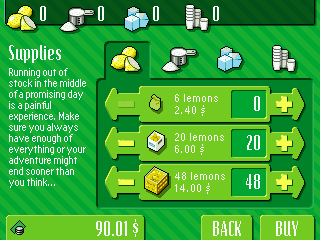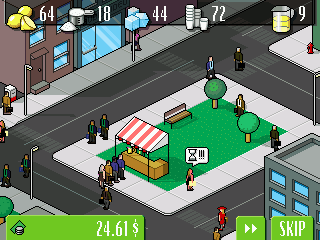|
|
Chris De Herrera's Windows CE Website |
|---|---|
About |
|
| By Chris De Herrera Copyright 1998-2007 All Rights Reserved A member of the Talksites Family of Websites Windows and
Windows CE are trademarks of
Microsoft All Trademarks are owned |
When
Life Gives You Lemons….. Hexacto’s
Lemonade, Inc.
By Allen Gall,
Copyright 2002
Revised 5/23/2002
[an error occurred while processing this directive]
Back in the old Apple II era, there was a game called Lemonade Stand. Although I certainly did my share of gaming on the Apple, I never got a chance to play the game. I’m told, however, that the game was fantastic and that it provided inspiration for Hexacto’s new Lemonade, Inc. game. Although the business simulation genre has been pretty much exhausted on the PC (the last title in the ubiquitous “tycoon” series was Mall Tycoon, released this month to poor reviews), this field is ripe new territory on the Pocket PC. And of course, the “tap anywhere” input method on handhelds provides interesting possibilities for interaction.
You might think that a lowly lemonade stand wouldn’t be the most interesting subject matter for a business simulation, but Hexacto pushes the “fun factor” all the way in Lemon. Like great desktop games such as SimCity, SimAnt, and Railroad Tycoon, Lemonade is never in danger of taking itself or its subject matter too seriously. Running a business is, after all, really just a game, and part of the fun is seeing how long you can stay around and, hopefully, make a profit.
The game offers two modes, career and challenge. While challenge mode is limited to how much money you can make in 30 days, career mode is open-ended. Regardless of which mode you choose, you start the game with a pitcher, a nondescript lemonade stand, and a fistful of cash. Your business is run on a day-by-day basis, so you’ll have to plan each day by purchasing supplies (enough to cover the day, but try not to buy too much of perishable items such as ice and lemons, or you’ll end up wasting money when they expire).
Any business owner will tell you that customers are fickle, and the art of running a lemonade stand is knowing what the customers want and how much they’re willing to pay. That’s part of what makes a game like Lemonade challenging and fun. As each day starts, you’re given a briefing screen with a weather forecast with numbers to indicate the temperature and symbols to indicate how clear the day will be. You’ll learn quickly how important it is to pay attention to the weather—for example, if the forecast for the day calls for cloudy skies and temperatures below 60, you’ll need to lower the amount of ice in your recipe (to prevent it from being watered down) and drop your price since demand for your product will be lower. On hot days, however, you’ll need to increase the amount of ice to keep the drink cool. Fortunately, it’s easy to gauge your customer’s reactions—if they’re happy or dissatisfied, a caption window will appear. To find out more specific information, simply tap on the caption window. You’ll also find news bulletins, some of which drop clues to business opportunities—for example, a blurb about an air conditioner failure at the mall is a hint that you might want to place you stand there that day to clean up on hot, thirsty shoppers.
As with a real business, the key to making money in Lemonade is maintaining that all-important balance between profit and loss. One of the biggest factors in the equation is price, and you’ll need to decide which strategy works best. Fortunately, the game provides a great deal of flexibility in this area. For example, you can lower the price (in units of $.10), which will reduce profit-per-cup but increase volume of sales, or you can increase the price (and therefore your profit margin) but reduce the amount of sales. Different players are going to have different styles, and finding which one works best for you is part of the fun. Fortunately, the screen where you set the price calculates your profit per cup. I found it helpful to take advantage of the laws of supply and demand—on cool days when demand is low, I usually drop the price to increase sales, and when temperatures reach 100 degrees of more, I jack up the price since demand is high. Your customers have their limits, however, and you’ll need to find the “sweet spot” between profitability and customer price tolerance.
In business, there’s a concept called “profitable growth.” For instance, the insurance company I work for in my day job grew at such unexpectedly high levels in 2001 that it didn’t have the resources to serve all of its new customers and ended up losing rather large amounts of money. Hexacto did a good job of modeling this phenomenon in the game. You can grow your business by having a low price, spending money on advertising, and having a good reputation, but if long lines start forming behind your stand, you may miss sales. Fortunately, statistics at the end of the day indicate how many potential customers you’ve served in addition to how many you’ve missed. There are also bars indicating the popularity of your stand and customer satisfaction, both of which impact how many people will want to buy your lemonade. Upgrades also offer a way of controlling your growth—many can help you increase your production capacity (allowing you to buy supplies in quantity and store them, thereby saving money) and serve more customers, but you’ll have to plop down some of your hard-earned cash to buy them. There are also other locations, such as malls and parks, but these “new markets” charge a daily rent fee and have a different set of customers with different expectations.|
|
| Buying supplies in larger quantities will save you money, but make sure you have the storage capacity to keep them from going sour. |
The game has an overall quality feel. Graphics are sharp and colorful, and menus are easy to navigate. During the business day, you’re given the temperature and the time, as well as a running tally of how much money you have. The game makes good use of landscape mode, and it’s fun to watch your tiny animated customers line up to buy your lemonade. Careful use of shading and even some weather effects give the game a more realistic feel. Sound effects are equally pleasant. You’ll hear a satisfying “clink” every time someone plops down some cash to purchase a glass of lemonade, and you’ll hear plenty of ambient noise and effects. When renting a spot downtown, for example, you’ll hear the usual noises you’d expect to hear in a large city.
|
|
| You can reap great profits in the downtown area—if you can afford the high rent. |
One neat feature some of the newer Pocket PC games have is a persistent Internet scoreboard that tracks user scores from all over the world. Lemonade has something even better—a virtual stock exchange. In challenge mode, scores are recorded and then given an evaluative rank. In career mode, scores are recorded based on revenue and profit. At the time of this review, the top scorer had revenue of over $300,000. That’s a lot of lemonade.
Hexacto has a nice little game on their hands. When various sites and magazines look back at the best products of 2002, I expect this game, along with Argentum, to figure highly on a lot of lists. I really wasn’t able to find any significant flaws. The progress of the game in career mode seems very balanced—as your stand gets more popular, the various upgrades and different locales provide just what you need to expand your productivity and profits. The only thing I can think to add to the game would be an option to take out a line of credit (to be paid back with interest) so the player could purchase upgrades early. Apart from that, this game is loads of fun and bodes well for the future of business simulations on the Pocket PC.
Lemonade, Inc. is available for $19.95 and can be purchased
at
![]() A demo is also available.
A demo is also available.
Allen Gall is a freelance game reviewer and the games editor for Pocket PC FAQ. If you have a game you'd like Allen to review, you can e-mail him at allen@Pocket PC FAQ
[an error occurred while processing this directive]




